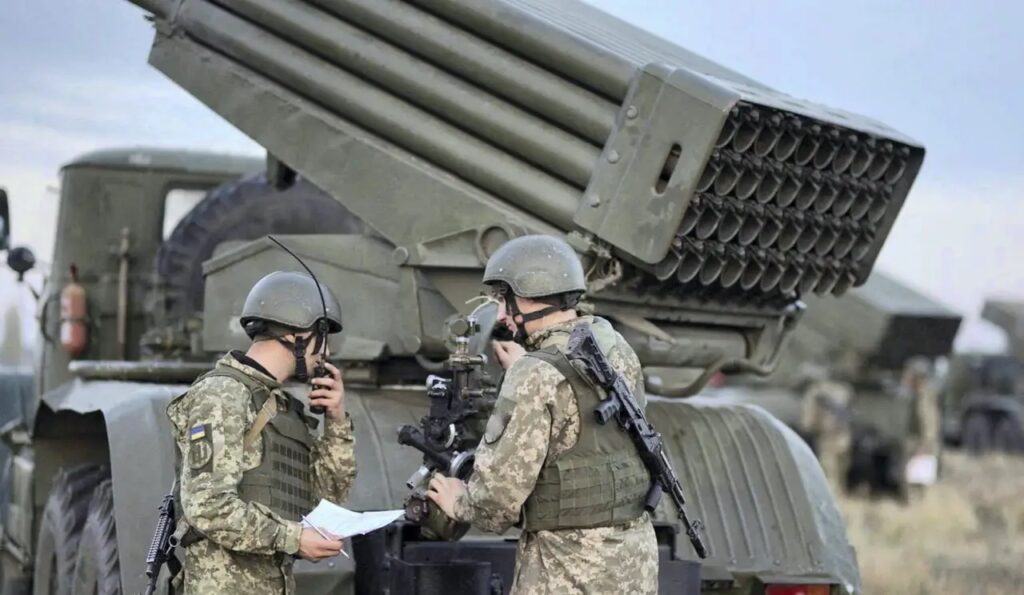
Jewish community leaders in eastern Ukraine say there is no sense of panic, despite the deteriorating security situation with Russia, and that previous experiences are helping them now
Sitting in his synagogue office in central Kyiv, Rabbi Pinchas Vishedski is keeping watch on Ukraine’s rapidly deteriorating security situation, as 100,000 Russian forces mass on the border and U.S. President Joe Biden predicts an imminent invasion.
A refugee displaced by the Russian seizure of the industrial city of Donetsk in 2014, the Israeli-born rabbi says his community, mostly comprised of fellow Jews from occupied eastern Ukraine, is ready to receive and support a fresh wave of refugees should the Kremlin order a fresh offensive.
“We are, as always, working in collaboration with the Federation of Jewish Communities of the CIS and the International Fellowship of Christians and Jews, and we are ready if, God forbid, there is an escalation and deterioration in the situation,” Vishedski told Haaretz by phone from the Ukrainian capital.
“God willing, we will always be here in order to help anybody who needs our help,” he said. “We already have the experience from 2014-15 and if, God forbid, refugees start arriving, we will immediately know what to do, how to receive them and where to place them. We are, unfortunately, experienced.”
Following the ouster of pro-Russian President Viktor Yanukovych in 2014, Moscow annexed Ukraine’s Crimean Peninsula and fomented a Russian-backed insurgency in the country’s east, which has claimed more than 14,000 lives and displaced millions.
Many Ukrainians have fled from the Russia-backed military conflict convulsing the east of their country. According to Israel’s Aliyah and Integration Ministry, more than 30,000 people moved to Israel from Ukraine between 2014 and October 2018.
Most of the membership of the Jewish communities of the cities of Donetsk and Luhansk were displaced by the conflict, even as Russian President Vladimir Putin claimed he was intervening in Ukraine to save Jews and other minorities from an alleged “rampage” of reactionary, nationalist and antisemitic forces.
And while the conflict has largely ground down to static trench warfare reminiscent of World War I, Western countries now fear Russia is planning a new assault against Ukraine. Russia denies such an attack, but says it could take unspecified military action unless a list of demands are met – including a promise from NATO never to admit Ukraine into the Western military alliance.
Ukraine’s president, Volodymyr Zelenskyy, himself Jewish, said Wednesday that Moscow is trying to induce a constant feeling of panic among Ukrainians. “All our citizens, especially the elderly, need to understand this: everyone needs to exhale. Calm down. Don’t run for emergency supplies like buckwheat and matches.”
While many in the Jewish community are wary of the possibility of renewed fighting, there is little sense of panic, said Rabbi Aryeh Shwartz, who serves as Vishedsky’s successor in occupied Donetsk.
“Whenever there’s a change in the security situation, there’s concern,” he said. If an evacuation is necessary, “we will certainly do everything so Jews can be safe,” he added. However, in a WhatsApp message sent from the Russian side of the front line, he noted that “there is no increase in the number of Jews who want to leave” the area.
Rabbi Mendel Cohen, the spiritual leader of the Jewish community in Mariupol, an industrial city just over the Ukrainian side of the line, told Haaretz: “We’re very concerned about developments, but are staying in place.”
Jerusalem is also following developments closely, said Michael Brodsky, the Israeli ambassador to Ukraine. He has called on Israeli citizens in the country to register with the embassy so they can be contacted quickly in case of an emergency.
According to Brodsky, there has been no indication of increased interest in immigration on the part of Ukrainian Jews since the beginning of the recent Russian troop buildup. He added that the embassy is “in touch with the Jewish communities around the country and will provide assistance if necessary.”
Despite the widespread concern, Inna Ioffe, CEO of the Jewish Confederation of Ukraine – one of the country’s largest Jewish umbrella bodies – has dismissed any notion of an invasion, instead expressing anxiety over financial and public health issues.
“We do not need to be prepared; we have had a military conflict in the eastern part of Ukraine for about eight years,” she said, citing a recent speech by Zelenskyy that characterized invasion fears as unfounded hype.
“We’re afraid not of war but of a situation of high prices for all good products, communal services and medicine. We’re concerned with new COVID-19 lockdowns and omicron,” she added.
